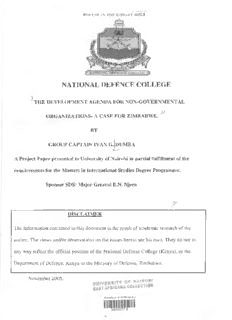
The development agenda for non-governmental organizations PDF
Preview The development agenda for non-governmental organizations
FOR'USE IN THE‘LIBRARY ONLY NATIONAL DEFENCE COLLEGE V he development agenda for non-governmental y/ ORGANIZATIONS- A CASE FOR ZIMBABWE. BY b GROUP CAPTAIN IVAN G DUMBA A Project Paper presented to University of Nairobi in partial fulfillment of the requirements for the Masters in International Studies Degree Programme. Sponsor SDS: Major General E.N. Njeru ■v 7 DISCLAIMER The information contained in this document is the result of academic research of the author. The views and/or observations on the issues herein are his own. They do not in any way reflect the official position of the National Defense College (Kenya), or the Department of Defence, Kenya or the Ministry of Defense, Zimbabwe. November 2005. \ University of NAIROBI Library DECLARATION I, Group Captain Ivan G. Dumba, certify that this project paper is my original work and that it has not been presented for a National Defense College Certificate in any other Defense College. Signed: Date: muivfRSITY OF NAIROBI COLLECTION This project paper has been submitted with the approval of my sponsor SDS. \ 1 ACKNQWLEDGENTS Many people contributed to the successful completion of writing this project paper. I am particularly indebted to my supervisor Professor Peter Wanyande for his invaluable guidance, the many lecturers of the University of Nairobi who spent a lot of their time in giving guidance on the writing of a project paper. I am indebted to the Commandant National Defense College, the Senior Directing Staff, NDC and the entire National Defense College faculty, whose wisdom and inspiration greatly contributed to the completion of this work. My gratitude goes particularly to the leadership of the Defense Forces of Zimbabwe and the Embassy of The Republic of Zimbabwe Kenya whose material and moral support made my studies possible. I am grateful to the many participants of Course 8 who in many ways shared with me the joy and challenge of the course for the entire academic year. My gratitude and indebtedness goes to my mother Joyce and late father Jairds Hamuzofi from whom I inherited the spirit of hard work, determination and the moral courage to succeed. Finally, I am indebted to my wife Vidah and our children Michelle, Robin, Lindsay and Megan for the utmost understanding, encouragement and support demonstrated over the entire period I was away from home for the studies. May the good Lord grant you his blessings and abundant love. u DEDICATION To my late father Jairos Hamuzofi whose guidance and example is still a source of inspiration for my entire family. -Y iii s ABBREVIATIONS AND ACRONYMS UN: United Nations NGOs: Non Governmental Organisations CBOs: Community Based Organisations INGO: International Non Governmental Organisation WTO: World Trade Organisation SAP: Structural Adjustment Program PRSP: Poverty Reduction Strategy Paper IMF: International Monetary fund UNDP: United Nations Development Program NEPAD: New Partnership for Africa’s Development APRM: African Peer Review Mechanism MDG: Millennium Development Goals MNC: Multinational Corporation ESAP: Economic Structural Adjustment Programme UDI: Unilateral Declaration of Independence IRCS: International Red Cross Society WCC: World Council of Churches IV MYWO: Maendeleo Ya Wanawake Organisation CCK: Christian Council of Kenya EEC: European Economic Community USAID: United States Aid GDP: Gross Domestic Product OCCZIM: Organization of Collective Co-operation of Zimbabwe ZERO: Zimbabwe Environmental Research Organisation ENDA: Environmental Development Activities NANGO: National Association of Non-Governmental Organizations LWF: Lutheran World Federation PPRLF: Pump-Prime Revolving Loan Fund GMB: Grain Marketing Board ZACH: Zimbabwe Association of Church Related Hospitals "/ FACT: Family AIDs Caring Trust SIDA: Swedish Development Authority VSO: Volunteer Service Organisation UNICEF: United Nations Children and Education Fund ORAP: Organisation of Rural Association for Progress CAMPFIRE: Communal Areas Management Programme for Indigenous Resources v VIDCO: Village Development Committee AGRITEX: Agricultural and Technical Extension Services SHDF: Self Help Development Foundation ZECLOF: Zimbabwe Ecumenical Church Loan Fund IGP: Income Generating Projects OECD: Organization for European Cooperation and Development NORAD: Norwegian Development Agency NACC: National AIDS Control Council \ VI TABLE OF CONTENTS Page No. Declaration i Acknowledgements ii Dedication iii Abbreviations and Acronyms iv Table of contents v List of Tables xi List of Annexes xii Abstract xiii -Y Chapter One. Introduction 1 Background 1 The research problem 4 Research objectives 5 Justification and purpose study 5 Scope 8 vii Literature review 9 Theoretical framework 25 Definition of terms 29 Development 29 NGO 29 NGO Development Activities 30 Modernization Theory 30 Dependency Theory 31 Marshal Plan 32 Research hypothesis 32 Research Methodology 33 Sources of data 33 'Y Projected outcome of the project ' 34 Chapter Outline 35 Chapter Two. Evolution of NGOs in Zimbabwe 36 Introduction 36 The pre-independence period 37 The post-independence period 42 Current funding of NGOs 51 viii Sectoral distribution of NGOs 53 Spatial distribution of NGOs 59 Introduction 59 Chapter Three. The Development Activities of NGOs in Zimbabwe 63 Introduction 63 Agricultural sector 63 Health sector 67 Education sector 69 Research 71 Environmental conservation sector 73 Income generating Activities 76 Chapter Four. The Effectiveness of NGOs in the Development Process 80 Introduction 80 y Financial capacity 81 Co-ordination 84 Operating Environment 84 Government support and appropriate institutions 85 Infrastructure 87 Interest of donors 87 IX
Description: